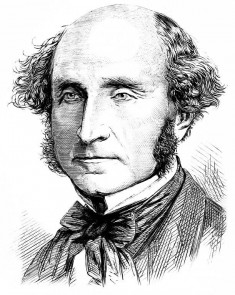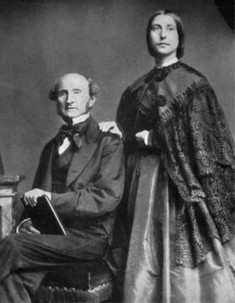| John Stuart Mill | |
|---|---|
 |
|
| Philosopher | |
| Specialty | Political economy |
| Born | May 20, 1806 Pentonville, London, England |
| Died | May 8, 1873 (aged 66) Avignon, France |
| Nationality | English |
John Stuart Mill was one of the important British philosophers of the 19th century. His insights into politics, culture, and society are often cited as being a major component to classical liberal thinking. At the core of his work is a commitment to expressing human freedom and civil liberties, themes that still resonate into the modern era.
Early Life of John Stuart Mill
John Stuart Mill was born in London on May 20, 1806. He was the son of James Mill, a philosopher and economist who contributed to the early education of his son. The early childhood of young Mill was a difficult one. He was not allowed to associate with other children and lived a very sheltered life. Among the reasons for this was young Mill was to carry on the work of promoting the philosophy of utilitarianism after his father and his father’s associate, Jeremy Bentham, passed on.
John Stuart Mill was very intelligent for a child as he learned Greek by the age of three and was reading the classics by the age of eight. At eight, he was also becoming well-versed in mathematics and was serving as schoolmaster to the other children in his home.
When he was 12, Mill invested a tremendous amount of time studying scholastic logic and, as a teen, he continued his education through traveling in France. Unfortunately, it might seem that he worked a bit too hard to achieve his high level of intellect as Mill suffered a nervous breakdown at the age of 20. Eventually, he was able to regain his proper mental health and would go on and attend the University College, London.
Mill became involved with a career in institutions of higher learning. He went on to study to assume the position of Lord Rector at the University of St. Andrews from 1865 to 1868. Around this same time period, he would also serve as a member of parliament and made history when he was the first official in parliament to suggest women were given the right to vote.
Philosophy of John Stuart Mill
John Stuart Mill was a philosopher who wrote a great deal about topics related to civil liberties and freedom. On a very basic level, Mill noted that a human being should be free to do whatever it is he or she wishes as long as no harm is inflicted on others. Such a belief is a running theme among those who prescribe to modern libertarian social beliefs.
 His seminal work On Liberty noted that those ruling over society should have limits on the power they exercise on individuals. In this work, Mill pointed out how extremely important it was for a society to allow free speech to its people. Unlike other philosophers who promoted notions related to freedom and individual sovereignty, Mill did believe that despotism was acceptable if for the good of backwards people.
His seminal work On Liberty noted that those ruling over society should have limits on the power they exercise on individuals. In this work, Mill pointed out how extremely important it was for a society to allow free speech to its people. Unlike other philosophers who promoted notions related to freedom and individual sovereignty, Mill did believe that despotism was acceptable if for the good of backwards people.
At his core, Mill was against tyranny in all its forms. He believed that history was filled with struggles against tyranny. He believed in the notion of social liberty, which entailed the protection of members in society against those rulers who may seem to crush their spirit and subjugate them.
Continuing on themes established by his father, Mill wrote the book Utilitarianism, which centered on ethics and their relation to happiness. The work was originally published as three essays in Fraser’s Magazine before being collected into a single book on ethical theory in 1863.
Economic Philosophy and Other Ideas
Mill was also libertarian in his economic philosophy. He believed strongly in the free markets and was opposed to the notion of the progressive income tax. His belief was those who worked harder were seeing their money siphoned away from them.
His political philosophy could sometimes be contradictory, but he is often credited as a person who worked at raising awareness of the importance of all citizens to participate in their government.
In terms of his religious beliefs, Mill was an atheist, although he did not seem to belabor this belief in his writings.
Mill’s Death
John Stuart Mill eventually contracted the condition of St. Anthony’s Fire, which was the colloquial name of the infection known as erysipelas. This was a serious condition and it contributed directly to his death on May 8, 1873.